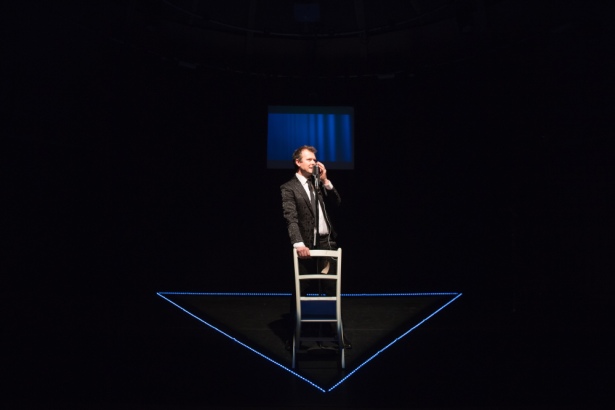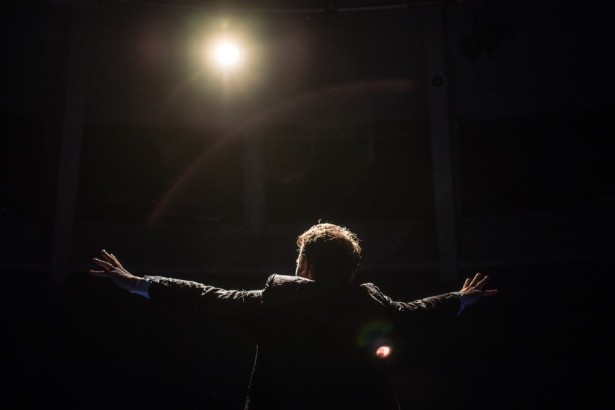This post comes from the Artists and Climate Change Blog
It’s 1957, and eminent herpetologist Dr. Karl Patterson Schmidt is examining a juvenile rear-fanged boomslang snake at the Chicago Field Museum, when he grasps the serpent behind the neck and is pierced by a single fang on the fleshy area between thumb and forefinger on his left hand. Presuming the snake’s venom to be non-toxic, Schmidt spends the next 24 hours documenting the increasingly horrifying effects of the venom until, in the middle of the following day, he suffers respiratory paralysis and shortly afterwards dies; hemorrhaging blood from his eyes, nose and mouth.
Fifty-eight years later, December 2015, I am perched amongst the early morning coffee drinkers in a busy Parisian street cafe close to Place de la République. I’m here with Doppelgangster as part of a Wales Arts International funded initiative for Cape Farewell’s ArtCOP21: a global festival of cultural activity on climate change running parallel to the 21st United Nations Climate Talks (COP21). My multi-award winning Australian colleague, playwright and cultural commentator Tobias Manderson-Galvin’s voice cuts through the French chatter, as he assertively slides a copy of American writer Roy Scranton’s recently published essay Learning How to Die in the Anthropocene (2015) under my nose and suggests that one of us ought to read it.
Scranton reflects philosophically upon his nightmarish experience as a United States soldier in Iraq during the second major Gulf conflict. By drawing upon Samurai teachings and accepting that he was, in effect, already dead, Scranton explains that he was able to reconfigure his relationship to the horrors of war and operate effectively in hazardous circumstances. Upon returning to America, Scranton’s attention turned to global warming and the advent of what scholars proposed as a new epoch, the Anthropocene; a new age in which the effects of human activity are so profound that we are considered a significant geological force, nudging ourselves towards our own extinction with every purchase of multipack avocados. Drawing upon his earlier experiences, Scranton proposes that in the face of this ecological crisis, there is more dignity to be found in accepting our death and greater hope in the possibilities that that acceptance affords.
The Paris Climate Accord (December 2015) offered hope that collective action might prevent global temperature increases from rising above the agreed safe limit of two degrees celsius above pre-industrial levels. Whilst many were skeptical –  including environmentalist Naomi Klein who rebuked the deal as “woefully inadequate†due to its failure to directly reference fossil fuels – there was great enthusiasm in response to global support for it and, more specifically, the public commitment of wanton carbon emitters the United States. The mood was celebratory. However, in the two years that followed, while death quietly clipped the wings of great cultural icons (and a number of animal species), the United Kingdom shamelessly turned away from climate politics, towards the slightly less looming concern of whether to remain part of the European Union. Then came the tawdry US presidential campaign, which farcically put Trump and his band of climate denying cronies in power and actively threatened the Paris deal. By the end of 2016 that target of staying below two degrees was looking less achievable.
Two years on from Paris, and on the eve of the 23rd COP in Bonn, Germany, Tobias and I wanted to create a performance that responded defiantly to these catastrophic events. We were also intrigued by Scranton’s ideas and wanted to put them to work in a theatrical context. Everybody Loses: The Death Diary of Karl Patterson Schmidt seeks to respond to current ecological and geopolitical events whilst at the same time exploring and problematizing Scranton’s notion that somewhere in the acceptance of our inevitable death lies hope. Everybody Loses is staged as an aesthetic contemplation of Schmidt’s “death diary.†At the same time, it is an oblique investigation into the greatest concern of our age, the onset of the sixth great extinction.
Everybody Loses is a one-man show in which the audience encounters Schmidt (played by myself) in his final hour. The scholarly detail with which he documents his own passing mirrors the detail with which we are currently documenting the calamitous changes in our planet, and similarly failing to act; whether through denial, cognitive dissonance, or impotence in the face of the bloody symptoms. Doppelgangster’s overtly antagonistic aesthetic seeks to stage the moment before death as a space of provocation and an opening of a political dialogue with the spectator.
Tobias and I had been toying with questions of life, death, creation and destruction, in Doppelgangster and MKA: Theatre of New Writing’s recent work Eternity of the World: Part Missing (Melbourne/Sydney July 2017). Tobias co-wrote and performed it as a two-hander with the Australian performance artist and writer Kerith Manderson-Galvin. Everybody Loses was conceived as a companion piece and we’ve labelled them Doppelgangster’s Ouroboros plays – a reference to ancient Egyptian mythology and the serpent that ate its tail; a symbol first seen in an ancient funerary text found in the tomb of Tutankhamun.
In the development of both performances we worked closely with improvisational guitar and drums duo Maria Moles and Adam Halliwell (Melbourne). Their percussive and flute driven compositions have given Everybody Loses a hypnotic, sensual and at times disturbing quality, reinforced and interrupted by the sharp, dark, brooding and often brutal film footage, shot in the post-industrial wastelands outside Sheffield (UK) by British documentary filmmaker and The Guardian contributor Dr. Sam Christie (Forecast 2015). The provocative text, which is infused with Tobias’ trademark humour and lyricism, and my own emphatically British and pseudo-colonial delivery to microphone, combine with these digital elements in a relentless seventy-minute monologue-cum-autobiographical obituary. Our aim is to create an edgy and at times startling performance about the moment before death, one that draws the audience in with a heady mix of charm and humour whilst simultaneously placing real demands upon them to contemplate our individual and collective mortality.
Everybody Loses was developed with support from Sheffield Hallam University, MKA Theatre of New Writing and Aberystwyth Arts Centre, Wales, where it underwent development in the summer before premiering at the venue on 23 November 2017.
(Top image: Dr. Tom Payne in Everybody Loses: The Death Diary of Karl Petterson Schmidt. Photo by Keith Morris.)
______________________________
Dr. Tom Payne is a theatre-maker and ecological raconteur. He is Co-Director of the UK/Australian performance company Doppelgangster, which he runs with award-winning Melbourne-based playwright Tobias Manderson-Galvin. He is a Lecturer in Performance Studies in the Department of Stage and Screen at Sheffield Hallam University, and Chairperson of the highly acclaimed MKA: Theatre of New Writing. His research specialisms include site-specific performance, performance and online environments, relational aesthetics, and participatory arts approaches to climate change and the eco-social.
Artists and Climate Change is a blog that tracks artistic responses from all disciplines to the problem of climate change. It is both a study about what is being done, and a resource for anyone interested in the subject. Art has the power to reframe the conversation about our environmental crisis so it is inclusive, constructive, and conducive to action. Art can, and should, shape our values and behavior so we are better equipped to face the formidable challenge in front of us.




